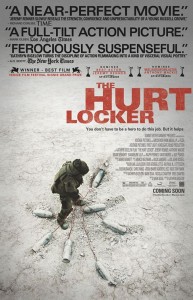Putting the HURT on someone…
 Prepping for a lecture this Friday in Seattle following a showing of 2009’s Best Picture winner The Hurt Locker, and thought I’d try something new for the blog with an advance request for thoughts and comments from our avid readers.
Prepping for a lecture this Friday in Seattle following a showing of 2009’s Best Picture winner The Hurt Locker, and thought I’d try something new for the blog with an advance request for thoughts and comments from our avid readers.
What salient speaking points regarding the film should I include? Biblical concepts that came to mind? Particular scriptures that resonated as you watched?
Anything I dare not miss? The moment that defined the film for you?
The film deals pretty heavily with the notion of identity, but I’m curious what random thoughts or personal takeaways regular Cinemagogue folks already learned from their viewing.
Post your comments here if you’d like to inform and influence Friday’s post-show lecture, which will later be featured on audio here on the site.



Hi James
I think the key scene is his conversation with his daughter – “it gets to the point where you only like a few things, or maybe just one” – it seems to resonate with this idea of not being able to go back to normality after experiencing the radical. An aisle full of different types of cereal just doesn’t do it any more. Consumerism doesn’t hold a candle to the thrill of doing what he loves, the thing he is best at and was built for.
Maybe there are parallels to The Matrix – once Neo’s eyes are opened and he sees what life can be like, he can never return to “normality”, nothing less than his new life, with its new experiences will do.
Is his recklessness born out of indifference to his survival, or an egotistical feeling of indestructability? Does he consider his life nothing, or does he think he is super-human?
I guess there are problems of re-immersion in ones own culture as well. He has sampled and enjoyed a different way of life and the love of his family is not enough of a pull in itself. I know many long-term missionaries find it hard to come home – reverse culture shock. Does he now feel more at home away from home? Is he now a citizen of the war zone and feels out of place in his old way of life?
I agree with Dave that the conversation with his daughter was important. Another important scene for me (though it’s been a while since I saw it) was the one after the last bomb exploded and Anthony Mackie’s character breaks down because he just wants to go home and be with his family. It is very apparent that there is a disconnect between the two characters in that scene. In what could have been a moment of deep connection between two soldiers, there wasn’t. Renner and Mackie were great in that scene. As much as Renner wanted to connect with Mackie and empathize with him, he was incapable. He had just had a near death experience and it made him feel alive. Mackie just had a near death experience and it scared him to death.
Something has my attention and it´s the fact that although Seargeant William is the only character in the movie (I think) that´s living his life with a purpose, he´s not a “good person” in the way he acts. He´s selfish in a million ways (altho sometimes he cares for his teammates), reckless, proud and basically hurt. He finds his purpose in war, making him great for fighting, but he simply doesn´t work as a human being in many senses. It´s true that we become what we worship.
(Pardon my english I´m from Dominican Republic).
Thanks guys, this was pretty helpful going into the weekend, we’ll post a video review next week with a longer audio exploration to follow.